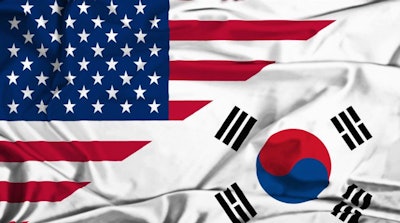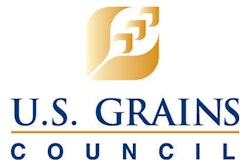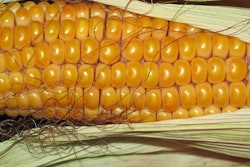
The United States and South Korea have reached an agreement in principle to revise and preserve the six-year-old U.S.-South Korea Free Trade Agreement (KORUS), the administration announced last week.
As revised, KORUS retains the agricultural provisions of the original pact. Trump administration officials said the updated agreement will boost exports of U.S.-manufactured motor vehicles and auto parts to South Korea, which agreed to increase its cap on imports of U.S. motor vehicles to 50,000 cars per manufacturer per year. The accord also will allow the United States to extend its 25 percent tariff on Korean trucks until 2041 – or a total of 30 years after KORUS was first implemented in 2012. Previously, the U.S. tariffs on Korean trucks were scheduled to phase out by 2021.
Under the pact, the Trump administration’s proposed U.S. steel tariff of 25 percent will not apply to South Korea, but the country did agree to a new quota that “will result in a significant reduction in Korean steel shipments to the Unites States,” according to the Office of the U.S. Trade Representative. Specifically, under the agreement, Korean steel exports to the United States will be subject to product-specific quotas equivalent to 70 percent of the average annual import volume of such products during the period 2015-17. The proposed U.S. aluminum tariff of 10 percent still will apply.
The “agreement in principle” also features a provision in which South Korea agreed to reform its custom-inspection procedures. South Korea under the agreement will address long-standing concerns with onerous and costly verification procedures through a new agreement on principles for conducting verification of origin of exports. In addition, a bilateral working group will be established to monitor and address future customs-related issues that may arise.
Secretary of Agriculture Sonny Perdue cited the improvements to South Korea’s customs procedures, which he noted “have been a substantial concern” for U.S. agricultural and industrial goods.
The NGFA had joined other farm, agribusiness and food groups to stress with the Trump administration the importance of maintaining KORUS, which has helped boost U.S. exports of beef, pork, wheat, corn, sorghum and other agricultural commodities.
According to USTR, since KORUS went into effect in 2012, the U.S. trade deficit in goods with Korea increased by more than 73% from $13.2 billion to $22.9 billion (2017), while the overall trade deficit increased by 70% from $6.3 billion to $10.7 billion (2017).
“The improved KORUS agreement reflects the president’s leadership in delivering more reciprocal trade outcomes benefiting U.S. workers, exporters, and businesses,” said U.S. Trade Representative Robert Lighthizer. “The United States and Korea have strengthened an important economic relationship by agreeing to substantial improvements to KORUS that will help rebalance our trade, reduce our trade deficit and expand U.S. export opportunities.”
Once the text of the amendments and modifications to KORUS is completed, the agreement will be subject to the United States’ and South Korea’s respective domestic-review process. In the United States, modifications to the tariff schedules will undergo consultation and “layover” procedures contained in the law implementing KORUS, which include a 60-day consultation period with Congress.

















